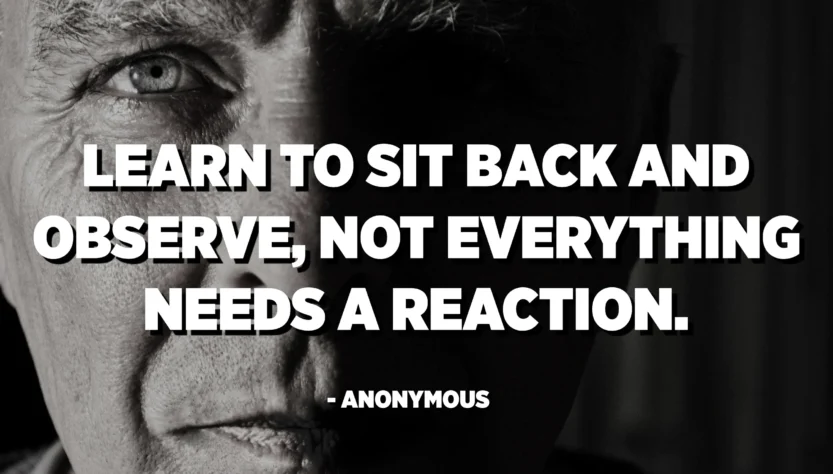In the fast-paced world we live in, there is an ever-growing emphasis on productivity and constant motion. We are bombarded with messages promoting the importance of being on the move, hustling, and always striving for more. While ambition and hard work are undeniably valuable, there’s a subtle yet powerful lesson that often goes overlooked – the art of sitting back and observing. In a society that glorifies busyness, taking time off to reflect and observe might seem counterintuitive, but it is a crucial aspect of personal and professional development.

The Cult of Busyness
In a culture that values productivity above all else, the act of slowing down and observing is often deemed a luxury. The glorification of busyness has created a society where the idea of taking a step back is considered a weakness or, worse, a lack of ambition. However, the relentless pursuit of constant activity can lead to burnout, stress, and a diminished overall well-being.
The pressure to be ‘always on’ can adversely affect our mental and physical health, leading to a vicious cycle of exhaustion and decreased productivity. In our quest for success, we often overlook the importance of strategic pauses, moments of reflection, and the power of simply observing the world around us.
must read=learn to sit back and observe. not everything need – tymoff
The Art of Observation
Observation is more than just a passive activity; it is a skill that requires conscious effort and mindfulness. By intentionally slowing down and observing, we open ourselves up to a wealth of information and insights that are easily missed in the hustle and bustle of everyday life.
Learning to observe allows us to gain a deeper understanding of ourselves, our surroundings, and the people we interact with. It provides the opportunity to see patterns, identify opportunities, and make more informed decisions. Whether in the workplace or personal life, the ability to step back and objectively observe can be a game-changer.

Breaking the Time Off Stigma
Taking time off, whether from work or other commitments, is often stigmatized as laziness or a lack of dedication. However, this couldn’t be further from the truth. Time off, when used strategically, can be a powerful tool for rejuvenation and self-discovery. It allows the mind to recharge, creativity to flourish, and perspective to shift.
Rather than viewing time off as a hindrance to success, it should be seen as an investment in personal and professional growth. It is during these breaks that we can reflect on our goals, assess our progress, and recalibrate our strategies. By embracing the concept of taking time off, we empower ourselves to be more focused, efficient, and innovative when we return to our pursuits.
The Benefits of Strategic Pauses
- Enhanced Creativity: Stepping away from the constant grind provides the mental space needed for creativity to thrive. Breaks allow us to approach challenges with fresh perspectives and generate innovative solutions.
- Improved Decision-Making: Observation and reflection contribute to better decision-making. Taking the time to assess situations from a distance enables us to make more thoughtful and strategic choices.
- Stress Reduction: The incessant pressure to keep going can lead to burnout and increased stress levels. Strategic pauses give us the chance to unwind, reducing stress and promoting overall well-being.
- Enhanced Productivity: Counterintuitive as it may seem, taking time off can actually boost productivity. By allowing ourselves moments of rest, we return to our tasks with renewed focus and energy.
Cultivating the Art of Sitting Back
- Schedule Regular Breaks: Integrate short breaks into your daily routine. Whether it’s a walk in nature, a brief meditation session, or simply a few minutes of deep breathing, these breaks can make a significant difference.
- Reflect on Experiences: Take time to reflect on your experiences, both positive and negative. What did you learn from a particular situation? How can you apply those lessons moving forward?
- Practice Mindfulness: Embrace mindfulness practices to stay present in the moment. This could include meditation, mindful breathing, or even just consciously paying attention to your surroundings.
- Engage in Hobbies: Pursue activities that bring you joy and relaxation. Whether it’s reading, painting, or playing a musical instrument, engaging in hobbies provides a valuable break from the demands of daily life.
Conclusion
In a world that constantly urges us to move forward, learning to sit back and observe is a skill that can set us apart. It is not an endorsement of idleness but a recognition of the power that intentional pauses hold. By incorporating strategic breaks into our lives, we can enhance our creativity, improve decision-making, and ultimately lead more fulfilling and successful lives.
So, the next time you feel the weight of constant activity pressing down on you, remember that not everything needs time off, but strategic breaks are a vital part of the journey. Embrace the art of sitting back and observing, and you may find that the most profound insights and innovations emerge from moments of stillness.
